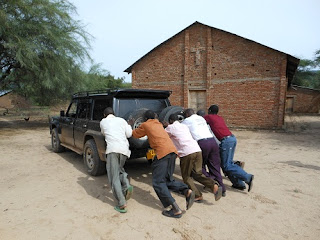After visiting five very successful SACCOS last week, we had
a disappointing start to our second week of visits when we visited Nyanzwa
today. Nyanzwa is located about 3 hours
drive from Iringa. To reach Nyanzwa you
take the road back towards Dar Es Salaam down the escarpment. At the foot you take a dirt road for about 35
kilometers. Assuming the Masai and their
cattle don’t delay you too long you will make it in 45 minutes.
Arriving at the church we were met by the pastor and the
SACCOS chairman. The pastor seemed
somehow familiar to us – but we could not place him. We have been to Nyanzwa on 4 other occasions –
but we were sure we had not met him here.
We went into his house where we were greeted by his wife. Suddenly it struck us; we had met him when we
were at Kipaduka a few years ago. When
we asked if they remembered us from Kipaduka mama said, “No – but then all
white people look alike.”
After having coffee
we met with the officers of the SACCOS.
When we had been here in 2008 we were impressed by the good records and
active participation of the members, now we felt that the SACCOS is being
poorly managed and needs some changes.
We found that recent record keeping is so poor that we were unable to
come away with any details. We also
confirmed that despite having assets of $33,000 this SACCOS has only $1,350 in
cash available. And where is the
rest? It is currently loaned to the
members – who all seem to be falling behind in their payments!
The Nyanza SACCOS has about 200 members; only 48 of them are
women. At our meeting today with the SACCOS leadership we noticed that of the
nine members present, only one of them was a woman. Lukia, the woman, was the only member in the
roomful of leaders who had repaid her loan in full. All of the other leaders had loans
outstanding, some of them small, others fairly substantial (by Tanzanian standards). Sandy commented that in every other SACCOS we
visited where the membership and leadership was equally divided between men and
women (and heavily favoring women in the case of Mkimbizi), record keeping was
well done and loan repayment was close to 100%.
She followed with a question of whether or not the men in the room
thought there might be a correlation here.
This brought smiles. Then Tom
asked if this (repaying loans on time) was something that women can do and that
the men were not capable of. This
brought some frowns and a bit of discussion.
Brown (a representative of the Iringa Diocese head office),
Tom, and Itiweni took turns lecturing the leaders about responsibility, setting
an example, commitment, etc. We told
them they needed to form a committee to go to each and every member with a loan
and sit with them and make a plan to repay their loans by the end of June
(harvest time). They said we will do
this tomorrow. “YOU WILL DO THIS TODAY”
Brown told them.
Following the meeting we interviewed Lukia about her
dealings with the Nyanzwa SACCOS. Her
loans were taken out in the early days of the SACCOS (2007-2008). She had taken out loans twice; her first loan
in 2007 was for $50 which she used to plant onions. This loan was repaid and she took out a second
in 2008 for $120 which she used to plant beans and onions. After she repaid her loan she bought pigs,
and has situated herself so that she hasn’t needed to borrow anything in the
last three years. She has used her
profits to send her two children to secondary school.
Our second interview was with Salima, a widow supporting two
children and two grandchildren. We
recognized her immediately as a woman we interviewed in 2008. She is another woman who borrowed money in
2007 and 2008; loans that were paid in full.
She didn’t take out a loan in 2009 because the weather that year was
such that she didn’t want to gamble on being able to repay a loan. When she applied in 2010 her loan application
was turned down, due to lack of money for loans. Salima was probably one of the best credit
risks that this SACCOS could have taken.
When we went to start the car to go home we found the
battery was dead! “Ooops – I forgot and
left the headlights on,” said Tom. Never
mind – with a handful of volunteers pushing the car was soon started and we
were on our way. Getting back to our
house at 6:30 we realized that it had been another 11 and ½ hour day!
Going down the escarpment can be a bit tricky with the run away trucks!
It's only a 45 minute drive if you don't meet too many cattle.
Mama didn't recognize us.
Itiweni pounds the table. Will they listen?
Of the officers and board members only Lukia had repaid her loan.
The widow Salima was turned down for her loan. She was probably the most reliable borrower of all!
The goats sure liked our car!
I guess it takes one battery or five men to start our car!








It's actually good to know that everything isn't roses. I wish Itiweni and Brown the best in following up and getting things on track.
ReplyDeleteHope you're holding up under this crazy schedule.
Take care,
Dave